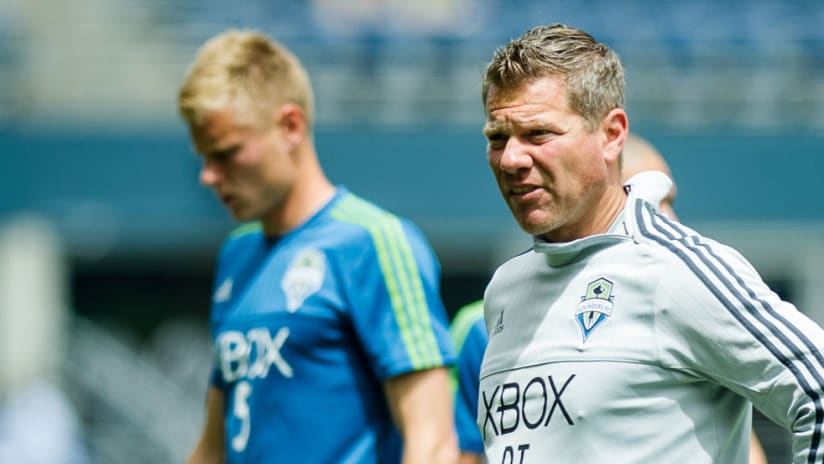SUBSCRIBE TO THE PODCAST:iTunes | Stitcher | RSS FEED | DOWNLOAD
Players skilled enough to reach the professional level are often lauded for their relentless work rates. But that truism has a flip side: Many of soccer's elite performers rest far more each day than their fellow humans, a lesson the Seattle Sounders try to drive home to their squad whenever possible.
Using high-tech wristwatches that track sleep patterns, Seattle's highly-respected sports scientists have spent significant amounts of time and money to track their players' rest habits over two- to three-week periods during various stages of the season.
“We wanted to show players how they have been sleeping and if they can get some help,” Sounders performance analyst Ravi Ramineni told MLSsoccer.com. “Sleep is the best recovery tool, and if you get seven nights of good sleep every week, your chance of getting injured is less. You probably are going to be in better shape, physically and mentally, to play.”
Ramineni noted that Chelsea and Ghana star Michael Essien was known for sleeping some 14 hours a night – nearly double what a typical layperson gets – whenever possible. Those who aspire to similar somnolence can reap direct benefits in terms of injury avoidance, a fact revealed most clearly when new arrivals affected household patterns.
“One of the biggest red flags we have is guys that have kids,” said Dave Tenney, Seattle's manager of performance and sports science (pictured above). “Almost across the board, guys would have their first child and then end up having some sort of soft-tissue issue not soon after, because they go from getting 8-9 hours sleep a night to all of a sudden getting 4-6 hours of sleep a night.
“That shocked their body enough, and the lack of recovery is a huge red flag.”
As it turns out, domestic life influences rest in multiple ways.
“Our single guys all slept pretty much the same, whether we were at preseason or back at home,” said Tenney. “The married guys actually slept worse when we were away in preseason. We didn’t expect that at all. So we went to the guys, and I remember asking Djimi Traoré, ‘Djimi, why do you sleep an hour less?’ He’s like, ‘Well, my wife makes me go to sleep at 10:30, so I go to sleep. [On road trips], I stay up and watch TV.’
“So you don’t think about the married guys, who are on a very strict schedule, and then they are away, on a road trip or at preseason training, and they actually don’t sleep as well.”
Ramineni emphasizes, to Seattle's younger players in particular, that schedule is just as important as amount.
“The number of hours of sleep is important, but it’s also really important that you always go to bed roughly at the same time” he said. “If you sleep an average of seven hours per night, but one night you [go to sleep] at 10 pm and another at 2 am, that is not an optimal thing.
“Our best players go to bed roughly at the same time, sleep roughly seven, eight hours a night, and I think that helped us to show an example for the younger guys who still are figuring out how to get better. That’s a really valuable tool for them to learn.”
Tenney sees myriad potential for further development in this field, but predicts hard choices as the scope of technology intensifies in the years ahead.
“In the NFL, they have tried to do sleep tracking, and there's privacy and players' union issues,” he said. “Where is the line of measuring things once a guy goes home? I think sports science is really good at getting a lot of good data; the next question is, how invasive to the athletes' private lives can you be, or do you want to be?
“For us, we’ve just focused on the education and importance of good sleep, and I think guys get it.”














